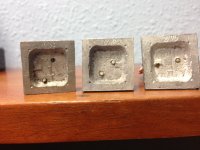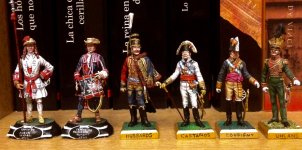I'd want something to show that they came originally from the shop. It's not an absolute, of course; I recognize that there might not be any documentation, eg, sales slip, or original boxes. But I'd want to be able to confirm any claim made by the seller, as best I could. The ideal in this case--a Grail, as it were--would be that these came straight from the shop to the original owner, who has had them in his possession up to now, and that he kept receipts of the sale, the boxes, etc, and they're all available. And if it can't be confirmed, then personally, I'd factor that in to my bid amount.
In the case of an item like these, where the figures were sold as kits, as well as finished in the studio, it's something I'd ask. Again, I'm not challenging this seller. But I recall auctions for Staddens, for example, which were presented as factory finish, but there was nothing to confirm them, such as the stamp or "signature" that can be found under the bases of some. And the quality of the painting tended towards something a hobbyist painted, rather than an experienced painter at the shop.
And in a broader sense, it's part of educating ourselves as buyers. I would apply the same kind of thought to buying a beer stein, for example. First, I've read as many books on them as I can, and other sources, like magazines and catalogs. I know a bit about the origins, and the styles and materials over time, and the makers. Second, I've looked at a lot of them, in various places, flea markets, museums, my friends' collections. So I've armed myself and hopefully, it gives me a better position when buying. Same goes for toy soldiers, or any collectible.
Anyway, that was my thought, behind my question.
Prost!
Brad








